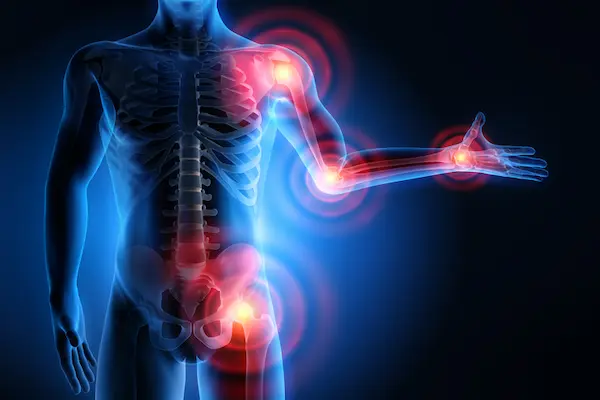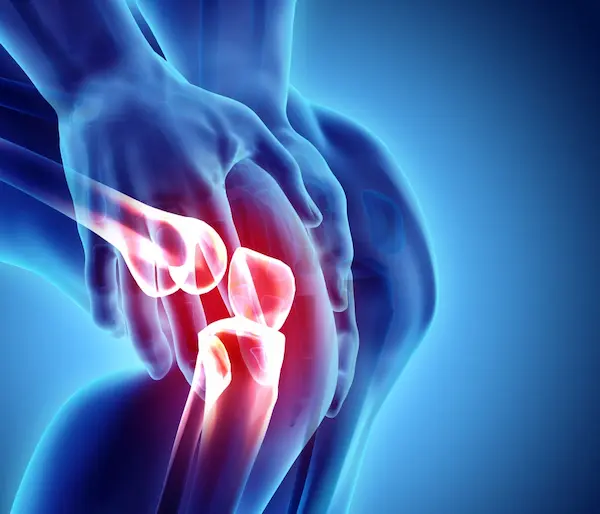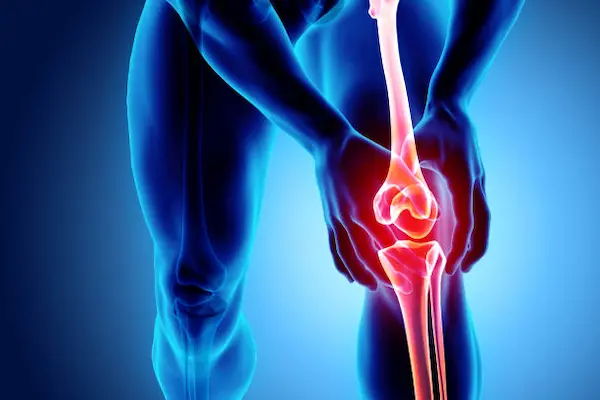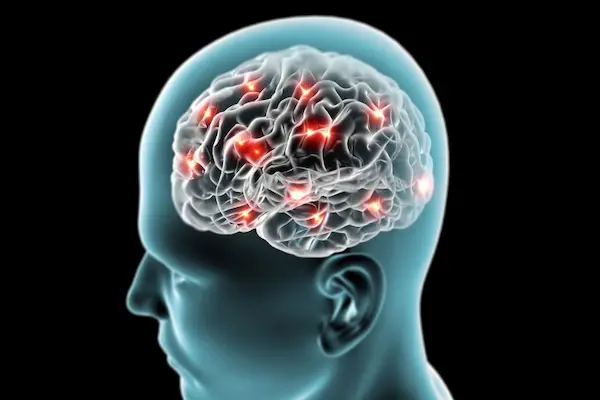
PROMO!
First order? Get 10% OFF with this code: 1storder
Written by

Somatropin Growth Hormone, also known as human growth hormone, has been studied for how it supports bones and joints. Research shows it helps bones form, improves mineral density, and aids the repair of cartilage and connective tissue. It also raises IGF-1, a growth factor that activates bone-building cells and strengthens the collagen framework that supports joint health.
In research models where growth hormone levels drop, bones become more fragile, and healing slows down. This is why scientists often explore not only somatropin itself but also related peptides such as HGH-191AA, IGF-1 LR3, MK-677, and BPC-157. Each of these has been investigated for its potential roles in bone recovery, cartilage health, and tissue repair, though the level of evidence varies.
Because each peptide influences repair differently, researchers often study them separately to understand their distinct effects.
Explore HGH-191AA from Peptide Works, a research peptide linked to somatropin growth hormone and studied for its potential role in tissue regeneration and bone repair.

HGH-191AA peptide is linked to Somatropin Growth Hormone and has been studied for its role in recovery. Research shows it may boost protein synthesis and trigger new cell growth, both of which are important for tissue repair and for supporting bone regeneration after stress or injury. These effects make it a focus in studies that explore joint health, bone density, and overall skeletal strength.
BPC-157 is another peptide examined for connective tissue repair. Studies suggest it may help tendons and ligaments recover, which connects closely with how HGH-191AA has been explored for cartilage repair and bone healing. Together, they give researchers a clearer picture of how peptides may influence long-term bone and joint resilience.
Since cartilage often suffers the most during injury, many studies turn next to whether peptides can support its repair.
Discover IGF-1 LR3 from Peptide Works, a modified growth factor peptide examined for its ability to support chondrocyte activity and cartilage matrix health in research models.
Cartilage injuries can be difficult to heal, which is why researchers investigate how growth factors may influence repair. Studies on Somatropin Growth Hormone suggest it can raise IGF-1 activity, which supports chondrocytes and collagen formation, both critical for healthy cartilage. This research links directly to joint support and long-term bone strength.
Researchers are also looking at other peptides in this field. HGH-191AA has been tested in models for its role in tissue renewal, while animal studies on BPC-157 suggest possible effects on tendon and ligament repair, which may also support cartilage health. IGF-1 LR3 and MK-677 are being studied for how they may influence bone density and joint strength, adding to the growing research on cartilage regeneration.
Among these, IGF-1 plays a central role, which is why its function inside cartilage cells has become a major focus.
Check out BPC-157 at Peptide Works, a research peptide explored in preclinical studies for its potential to support tendon, ligament, and connective tissue recovery.
IGF-1, which is released when somatropin growth hormone is active, plays an important role in cartilage repair. It stimulates chondrocytes the cells that create cartilage to grow and produce new tissue. This helps rebuild the cartilage matrix, which is made of collagen and proteoglycans that give joints both strength and flexibility.
Studies also show IGF-1 helps protect these cells from breaking down, which supports long-term cartilage health. Researchers have examined IGF-1 LR3, a modified version, for its stronger activity in sustaining chondrocyte growth. This interest reflects how peptide studies continue to look at cellular repair as a path to healthier joints.
Because the matrix is what gives cartilage its resilience, scientists have also looked at how peptides may aid its regeneration.

Cartilage matrix is made of collagen and proteoglycans, giving joints both strength and flexibility. When injury or stress damages this framework, recovery is slow because cartilage has little blood flow. Researchers are testing how peptides may encourage cells to restore the matrix by boosting collagen and matrix protein production.
IGF-1 LR3, a peptide linked to Somatropin Growth Hormone, has been studied for its ability to stimulate chondrocytes, the cells that rebuild cartilage. By enhancing their activity, it supports the renewal of the extracellular matrix. This targeted role shows why IGF-1 derivatives remain important in research on cartilage regeneration.
Beyond cartilage, researchers have also explored whether peptides may influence bone density, which is vital for preventing fractures and maintaining mobility.
MK-677, also called ibutamoren, is being studied for its effects on bone density through growth hormone pathways. It stimulates the release of IGF-1, which is important for bone formation and repair. In clinical studies, MK-677 raised markers such as type I procollagen and osteocalcin, both associated with bone turnover and skeletal activity.
When it comes to measurable bone density, results have been more modest. Gains have been observed primarily at the femoral neck, and in some trials, the most meaningful improvements appeared when MK-677 was combined with alendronate, a medication commonly used to treat osteoporosis. Because stronger bones reduce stress on joints, these findings suggest potential benefits for joint recovery, though longer studies are needed to clarify outcomes.
With each peptide showing different strengths, researchers often compare them side by side to identify where they may provide the most value.
Shop MK-677 from Peptide Works, a growth hormone secretagogue studied for its influence on IGF-1 release, bone remodeling markers, and skeletal resilience.

Each peptide studied alongside Somatropin Growth Hormone has a unique role in supporting bones and joints. HGH-191AA is noted in research for its association with protein synthesis and cell renewal, though clinical evidence is not yet available. IGF-1 LR3 is often highlighted for its ability to promote chondrocyte expansion and maintain cartilage structure, which helps explain why it remains central to cartilage-focused studies.
MK-677 is different because it works through a secretagogue pathway, raising bone remodeling markers and showing limited density improvements, particularly when paired with alendronate. BPC-157 stands out in preclinical studies for its reported influence on vascular repair and ligament resilience, which are critical for joint stability.
With so many peptides showing potential in different areas, researchers often compare them to understand where each one may offer the greatest benefit.
| Peptide | Research Focus | Bone & Joint Relevance |
|---|---|---|
| HGH-191AA | Protein synthesis & renewal (research context) | Investigated for potential tissue repair and regenerative models |
| IGF-1 LR3 | Chondrocyte activity & matrix proteins | Supports cartilage structure and joint function in studies |
| MK-677 | GH/IGF-1 secretagogue pathway | Raises bone remodeling markers; limited bone density gains, stronger with alendronate |
| BPC-157 | Preclinical tissue healing studies | Studied in animals for ligament and tendon repair, joint stability potential |
The variety of approaches highlights that no single peptide provides all the answers, but together they add valuable knowledge about different aspects of skeletal health.
Research into Somatropin Growth Hormone and related peptides is still evolving, but early findings are changing how scientists approach bone density and joint recovery. Compounds such as HGH-191AA, IGF-1 LR3, MK-677, and BPC-157 are at the center of studies exploring cartilage renewal, skeletal strength, and connective tissue support.
At Peptide Works, we provide high-quality research peptides for investigators worldwide who want to explore this growing field. While these compounds remain strictly for research use only, current studies suggest the future of bone and joint health may be shaped by continued advances in peptide science.
All peptides and compounds mentioned are strictly for research purposes only and not for human use.
[1] Dixit M, Poudel SB, Yakar S. Effects of GH/IGF axis on bone and cartilage. Mol Cell Endocrinol. 2021 Jan 1;519:111052.
[2] Wen C, Xu L, Xu X, Wang D, et al. Insulin-like growth factor-1 in articular cartilage repair for osteoarthritis treatment. Arthritis Res Ther. 2021 Oct 30;23(1):277.
[3] Murphy MG, Weiss S, McClung M, Schnitzer T, et al; MK-677/Alendronate Study Group. Effect of alendronate and MK-677 (a growth hormone secretagogue), individually and in combination, on markers of bone turnover and bone mineral density in postmenopausal osteoporotic women. J Clin Endocrinol Metab. 2001 Mar;86(3):1116-25.
[4] Vasireddi N, Hahamyan H, Salata MJ, Karns M,et al. Emerging Use of BPC-157 in Orthopaedic Sports Medicine: A Systematic Review. HSS J. 2025 Jul 31:15563316251355551.
[5] Doessing S, Heinemeier KM, Holm L, Mackey AL, et al. Growth hormone stimulates the collagen synthesis in human tendon and skeletal muscle without affecting myofibrillar protein synthesis. J Physiol. 2010 Jan 15;588(Pt 2):341-51.
ALL CONTENT AND PRODUCT INFORMATION AVAILABLE ON THIS WEBSITE IS FOR EDUCATIONAL PURPOSES ONLY.
DISCLAIMER: These products are intended solely as a research chemical only. This classification allows for their use only for research development and laboratory studies. The information available on our Peptide Works website: https://peptide-works.com/ is provided for educational purposes only. These products are not for human or animal use or consumption in any manner. Handling of these products should be limited to suitably qualified professionals. They are not to be classified as a drug, food, cosmetic, or medicinal product and must not be mislabelled or used as such.
Peptide Works
Related Articles

What are the Best Cognitive Peptides?
Cognitive peptides are short chains of amino acids that researchers are exploring for their potential effects on brain function. They

Achieving increased skin pigmentation without prolonged sun exposure has been demonstrated with Melanotan peptides in research. Two commonly studied options,

Can PTD-DBM Hair Growth Peptide Stop Balding?
Hair thinning and balding affect millions worldwide, often leading to frustration and limited options. This challenge has driven researchers to